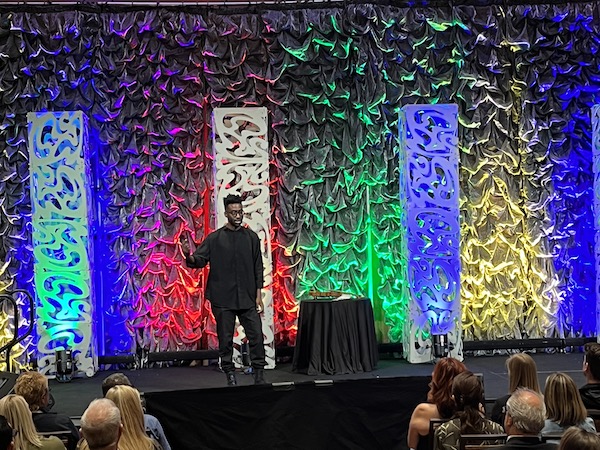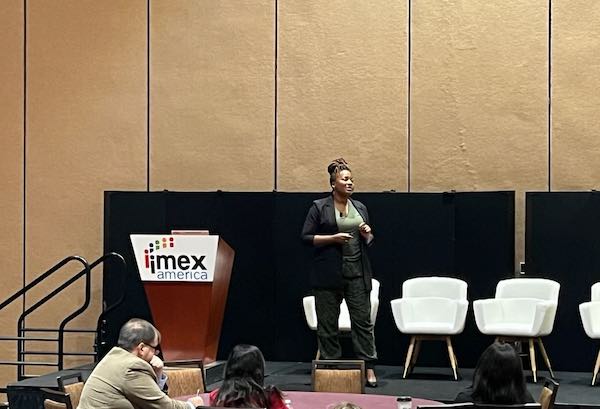Today’s keynote speaker at Smart Monday powered by MPI enthralled the crowd for several minutes without uttering a single word. You see, Kai Kight, whose keynote address at IMEX America was sponsored by Visit Anaheim, is a violinist—so he opted for setting the tone by playing a beautiful solo.
As it turns out, Kight is more than a brilliant composer/performer, as he followed the musical performance with an engaging, funny and thought-provoking presentation.

Kight told the audience about visiting a tea house where the owner chided him for taking out his phone, lecturing him on the importance of being present and pointing at the “no phones allowed” sign. (Of course, Kight didn’t have an opening to explain that he was actually just turning his phone to “do not disturb.”)
“In life, so often we say, ‘be present,’” Kight said. “We say, ‘be in the moment.’ But in music, if people in the audience aren’t engaged, it’s just a sign that the music isn’t doing its job correctly. What if the present isn’t actually up to par? It’s like we’re blaming the observer for their factual response to what’s in front of them, instead of looking at how the creatives can make something that’s actually engaging.
“We’re so harsh on ourselves for the ways we might disconnect from reality. But I think a more important question to ask is, what’s actually going on in reality that makes us want to disconnect in the first place?”
Kight said he recently presented to a large group of mostly accountants who essentially apologized for being less creative than him.
“I had like 10 or 12 of these interactions and I just walked away thinking, ‘Why do we need our accountants to be creative?’” he joked. “Creativity is instability. Raw imagination. It can be disorienting, all over the place. So, I was there at this conference all designed to help these accountants be more creative and it just brought up a theme that I experience a lot. I was wondering: Are we creating these moments, these experiences, these events for people in an attempt to fix them? In order to get them to be something that they’re not actually built for? Or are we creating these moments to help people learn how to use themselves correctly? Use themselves in their totality? And what would that look like? As we think about the content we create, a lot of times it is beautiful to bring in these outside voices, but I think a big part of it is also elevating just who they are naturally.”
Kight said that when creating moments of content for people, try to help them reach a point of clarity.
“Perhaps that clarity could be helping them bring to language things that they’ve done over the past few years that they had to make up on the spot and now they have this sense of wisdom in themselves that could only come from that,” he said. “When we think about content, it’s not just what we deliver to other people, but it’s also creating space for people to receive it.”
Who is ‘she?’

Jessie States, CMP, CMM, vice president of the MPI Academy, says that for Smart Monday, MPI reimagined what an educational experience could and should be.
“From our concentric community campfires to our unique hallway activations to our music-infused keynote Kai Kight, everything this year was just a little bit different and unexpected,” she says. “With partners Dear World, Song Division and Champaign Creative, we sought out ways to make participants the center of the experience.”
The She Means Business program by IMEX and tw magazine and supported by MPI featured a strong cadre of smart women and allies exploring visibility, advancement and gender equity in the workplace, States says.
“Our pathways to clarity included deep dives into storytelling and designing events and workspaces that create psychological safety,” she says. “Participants learned how to create a shared vision or purpose while communicating the power of their personal brands. We hope everyone left with a greater sense of clarity.”
Hospitality strategic consultant Zoe Moore, MS, CDP, opened her session—“Ain’t I a Woman? - Visibility & Advancement in the Workplace,” part of the She Means Business pathway—with an intriguing question: “Who is she?” (She Means Business is sponsored by Discover Puerto Rico.)
“When you say, ‘She Means Business,’ I want you to ask yourself, ‘Who is she?’ Allow your mind to wander. Is there an image that appears? A vivid memory? How would you describe her?” Moore said. “Is she defined by body parts, chromosomes, organs and body size? Is she defined by the male gaze? Is she described by her character, personality or skill? Is she defined by her ability or desire to bear children, cook or care for a spouse? Is she defined by the role she plays in the community or in the house? Is she defined by a degree, job title or bank account? Is she defined by the softness of her voice?”
Moore said that to be “she,” most women choose between who they used to be or are becoming.
“Is she limited to socially constructed biases?” she asked. “Am I only she if I look, think and believe, walk, speak and behave like the she your mind sees? Is my being she dependent upon your acceptance of the things that I do? I ask these questions for a reason. Because when you make the decision to hire, promote, collaborate, refer on this, I want us to concur: You’ll open your mind to see that who she is is not defined by you or defined by me. Who she is is defined by she. Who is she? Allow yourself to think on who she is.”
Moore encouraged attendees to think about how their individual career journeys will be told from many different perspectives.
“Some of those perspectives are going to be incorrect. But how do you maintain your story? How do you maintain your narrative? How important is it to you?” she said. “I want to encourage you to maintain control of your narrative not just by what you say but through your actions and your attitude, and the way that you live your values out loud. It’s very important that in all ways that you move throughout the industry in your career, in your different roles, that you interact with different people. The outcome of that interaction will go back to your attitude, your behavior, the things that you say. So maintain control of your narrative.”



